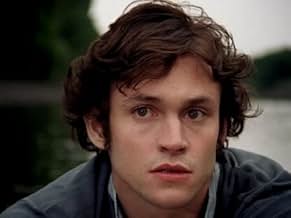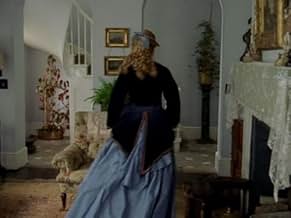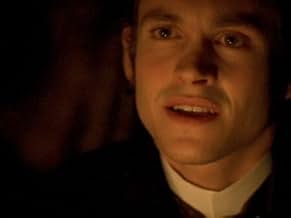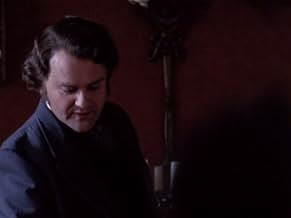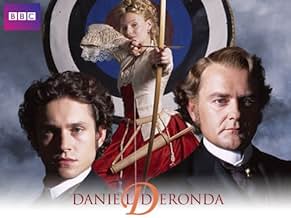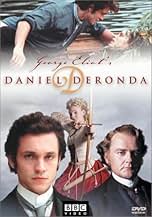Daniel Deronda
- Miniserie de TV
- 2002
- 53min
CALIFICACIÓN DE IMDb
7.2/10
5.4 k
TU CALIFICACIÓN
Gwendolen Harleth se siente atraída por Daniel Deronda, un desinteresado e inteligente caballero de parentesco desconocido, pero su propia necesidad desesperada de seguridad económica puede ... Leer todoGwendolen Harleth se siente atraída por Daniel Deronda, un desinteresado e inteligente caballero de parentesco desconocido, pero su propia necesidad desesperada de seguridad económica puede destruir su felicidad.Gwendolen Harleth se siente atraída por Daniel Deronda, un desinteresado e inteligente caballero de parentesco desconocido, pero su propia necesidad desesperada de seguridad económica puede destruir su felicidad.
- Ganó 3premios BAFTA
- 5 premios ganados y 4 nominaciones en total
Explorar episodios
Opiniones destacadas
7=G=
"Daniel Deronda" is a worthy knock-off of George Eliot's novel of the same name which tells of a young Englishman's search for meaning and purpose while enjoying a life of property and leisure. As with most Victorian period costume dramas out of the UK, this film is sumptuously appointed and well represented by the players and places as it meanders through the usual multiplicity of relationships from aristocrat to pauper with a Jewish thread for distinction. "Daniel Deronda" conjures a range of characters from a stoic martinet to a spoiled beauty to an attractive Jewess and beyond with love, greed, envy, guile, and death all swirling around the Deronda character as it manages to sort itself out with a coherent story arc and a more or less happy ending. A "should see" for anyone into Victorian flicks. (B)
The title gave me no clue to the absorbing romantic Victorian drama that was to follow. Said to be George Eliot's last great novel, it exposes in no uncertain manner the pitiful life of the Victorian woman, hardly more than an obedient slave and forced to respond to her husband's demands.
Hugh Bonneville stands out among the excellent cast as the nasty Henleigh Grandcourt who revels in watching women squirm under his aristocratic power and Romola Garai is perfect as Gwendolen who marries him, not for love, but to save her family from economic ruin.
Hugh Dancy in the title role of Daniel has immediate appeal with his handsome good looks touched with both shyness and sadness as he ponders over his past life and the unsolved mystery of his mother's identity.
After Daniel saves a woman from drowning in a river, the story takes an unexpected turn and concentrates on the Jewish problem of a permanent homeland. Daniel is much attracted to the woman he has saved and through his efforts to help her some mysteries of his own life are revealed to him.
The sets, costumes and photography capture exquisitely life in England in the Victorian era. Quite apart from the romantic drama, there is much to ponder over in this story. Thankfully to-day women have gained a degree of independence, though not entirely, and the Jews are still uncertain about the boundaries of their homeland.
I can recommend this film which is in 4 parts. Set aside a full evening to watch the story unfold. It's quite long (205 minutes) but a brilliant production.
Hugh Bonneville stands out among the excellent cast as the nasty Henleigh Grandcourt who revels in watching women squirm under his aristocratic power and Romola Garai is perfect as Gwendolen who marries him, not for love, but to save her family from economic ruin.
Hugh Dancy in the title role of Daniel has immediate appeal with his handsome good looks touched with both shyness and sadness as he ponders over his past life and the unsolved mystery of his mother's identity.
After Daniel saves a woman from drowning in a river, the story takes an unexpected turn and concentrates on the Jewish problem of a permanent homeland. Daniel is much attracted to the woman he has saved and through his efforts to help her some mysteries of his own life are revealed to him.
The sets, costumes and photography capture exquisitely life in England in the Victorian era. Quite apart from the romantic drama, there is much to ponder over in this story. Thankfully to-day women have gained a degree of independence, though not entirely, and the Jews are still uncertain about the boundaries of their homeland.
I can recommend this film which is in 4 parts. Set aside a full evening to watch the story unfold. It's quite long (205 minutes) but a brilliant production.
Having never read George Eliot's novel, I came into the film with only what I know based on the information friends have given me. The film is utterly exquisite. The costuming alone will have Anglophiles like myself crying from sheer envy, and there's enough archery, riding, and balls to weigh out the seriousness of the film, which is essentially two plots woven into one. An utterly heartless and wretched marriage for a spoiled young Gwendolyn in the form of the evil Grandcourt, a landowner whose sole pleasure lies in torment. Be it his wife or dogs, our heartless villain never takes greater pleasure than in dangling something before them and tearing it away again, only to feed it to someone else. We see a kind of barbarism in this act, be it with the family spaniel or his impoverished, abandoned mistress.
The second plot line, which I found slightly less interesting, was about the film's lead, Daniel Deronda, a presumed illigitimate boy who has been raised a country gentleman. One day while out boating he saves a Jewish singer from drowning herself, and sets out to discover his own true identity through finding her family. I don't know why, but I found myself itching through these scenes to get back to Gwendolyn and her pathetic plight of enslavement to her husband. A second viewing, once I knew the course of the characters, settled me a bit.
The acting is very stellar. There's not a weak link in the cast, although I have to say seeing Barbara Hershey seemed a little out of place in this Victorian paradox. The film makes numerous contrasts between good and evil, selfishness and humility, lies and deception. It's actually quite an achievement, and I was pleased at the amount of restraint showed by the filmmakers. The sexual tension between man and wife will go over most younger viewer's heads, something for which I'm grateful. It's rare we get a wonderful Victorian bodice ripper where the bodice stays on.
The second plot line, which I found slightly less interesting, was about the film's lead, Daniel Deronda, a presumed illigitimate boy who has been raised a country gentleman. One day while out boating he saves a Jewish singer from drowning herself, and sets out to discover his own true identity through finding her family. I don't know why, but I found myself itching through these scenes to get back to Gwendolyn and her pathetic plight of enslavement to her husband. A second viewing, once I knew the course of the characters, settled me a bit.
The acting is very stellar. There's not a weak link in the cast, although I have to say seeing Barbara Hershey seemed a little out of place in this Victorian paradox. The film makes numerous contrasts between good and evil, selfishness and humility, lies and deception. It's actually quite an achievement, and I was pleased at the amount of restraint showed by the filmmakers. The sexual tension between man and wife will go over most younger viewer's heads, something for which I'm grateful. It's rare we get a wonderful Victorian bodice ripper where the bodice stays on.
George Eliot was a truly excellent writer, but 'Daniel Deronda' was perhaps not her best work. This may go some way to mitigating the rather average results that emerge from this adaptation. Intended to be an insightful and complex tale of love, greed, selfishness, prejudice, maturity, and self-knowledge, the film (like the novel) proceeds more like two almost-unconnected stories, neither of which is wildly interesting.
Tying the two plots together is Daniel Deronda, played by Hugh Dancy. Dancy walks his way through, somehow making most of his lines seem redundant. To be fair, acting out a novel that uses extensive narration and introspection can't be easy, but a more experienced actor might have been a better choice to tackle such a tough job. The character of Daniel is a young man on the path of self-discovery, with detours along the way for a bit of romance and a little aimlessness. His relationships with two women form the fabric of the story.
The first tale revolves around the young, pretty, and petty Gwendolen Harleth. Played well, if not spectacularly, by the radiant Romola Garai, she is impetuous and selfish (though usually without intent), thinking that she is and must be the centre of attention. Garai plays her as someone who thinks that she has mastered the world around her, but is in fact nothing more than an indulged child. When her family is virtually ruined financially, she must choose between making a loveless marriage to maintain her high living, or quiet penury in the country. Naturally, she chooses the former. However, what she does not realise is that her suitor, Henleigh Grandcourt, is actually a cold, calculating sadist whose only interest in her is as an item of torment. Grandcourt is played by Hugh Bonneville, the one real stand-out in the production. Bonneville delivers an excellent performance as the deceptive, thoroughly wicked abuser. His Grandcourt is a flint-hearted reptile who first tricks Gwendolen with false kindness and then, when he has her in his grasp, begins to crush her with his cruelty.
Plot two centres on Daniel's relationship with Mirah Lapidoth, a Jewish singer whom he saves from a suicide attempt. Mirah is played by Jodhi May, who is actually rather flat in her delivery. May seems to go in for the "hushed whisper" technique quiet a bit. I suspect the idea was to portray Mirah as a sensitive, troubled woman, but in the end she just seems dull and high-strung. Her search for (and eventual reunion with) her family draws Daniel down a path that he would probably not otherwise have visited, and it has a significant impact on his life.
Good supporting work shores things up a bit, though the screen time is limited. The first comes from Edward Fox as Sir Hugo, Daniel's benefactor, a kindly old man of great wealth who acts as a sort of father to him. The always-excellent Greta Scacchi, looking strikingly haggard in character, is a ghost from Grandcourt's past who comes back to haunt his new bride.
I rate it 6/10.
Tying the two plots together is Daniel Deronda, played by Hugh Dancy. Dancy walks his way through, somehow making most of his lines seem redundant. To be fair, acting out a novel that uses extensive narration and introspection can't be easy, but a more experienced actor might have been a better choice to tackle such a tough job. The character of Daniel is a young man on the path of self-discovery, with detours along the way for a bit of romance and a little aimlessness. His relationships with two women form the fabric of the story.
The first tale revolves around the young, pretty, and petty Gwendolen Harleth. Played well, if not spectacularly, by the radiant Romola Garai, she is impetuous and selfish (though usually without intent), thinking that she is and must be the centre of attention. Garai plays her as someone who thinks that she has mastered the world around her, but is in fact nothing more than an indulged child. When her family is virtually ruined financially, she must choose between making a loveless marriage to maintain her high living, or quiet penury in the country. Naturally, she chooses the former. However, what she does not realise is that her suitor, Henleigh Grandcourt, is actually a cold, calculating sadist whose only interest in her is as an item of torment. Grandcourt is played by Hugh Bonneville, the one real stand-out in the production. Bonneville delivers an excellent performance as the deceptive, thoroughly wicked abuser. His Grandcourt is a flint-hearted reptile who first tricks Gwendolen with false kindness and then, when he has her in his grasp, begins to crush her with his cruelty.
Plot two centres on Daniel's relationship with Mirah Lapidoth, a Jewish singer whom he saves from a suicide attempt. Mirah is played by Jodhi May, who is actually rather flat in her delivery. May seems to go in for the "hushed whisper" technique quiet a bit. I suspect the idea was to portray Mirah as a sensitive, troubled woman, but in the end she just seems dull and high-strung. Her search for (and eventual reunion with) her family draws Daniel down a path that he would probably not otherwise have visited, and it has a significant impact on his life.
Good supporting work shores things up a bit, though the screen time is limited. The first comes from Edward Fox as Sir Hugo, Daniel's benefactor, a kindly old man of great wealth who acts as a sort of father to him. The always-excellent Greta Scacchi, looking strikingly haggard in character, is a ghost from Grandcourt's past who comes back to haunt his new bride.
I rate it 6/10.
I'm watching the British series Daniel Deronda every week on Swedish tv, and I will recommned it to everyone who fancies quality literary adaptations. The production values are impeccable, and the acting list very impressive. The one to catch your attention, though, is without a doubt Hugh Bonneville as the supervillain Grandcourt. He's everything a good oldfashioned villain from the 19.th century ought to be: suave, cool, arrogant, manipulative, morally corrupt, and with a razor sharp wit. In fact, he totally overshadows the meek and handsome, but oh so noble and earnest hero, poor Daniel Deronda! Hugh Dancy does his best, but it's hard work to make Deronda as interesting as Grandcourt! Likewise with the heroine. Romola Garai is beautiful to look at, but it's difficult to really care about Gwendolyn. She's such a silly, whiny, and cold person who would rather marry a man she dislikes than stoop to be a governess! It made me long to give her a good whipping! All in all, I think she and Deronda deserve each other, for being so awfully colourless and boring. I'd much rather spend the time watching the villain smirk, or wonder about miss Lapidoth's strange fate, among the Jews. As usual, being the villain pays off! Hugh Bonneville and David Bamber as Lush are the characters you remember! They really are perfectly selfish and dastardly mean!
¿Sabías que…?
- TriviaThe novel is set in the early 1860s, whereas the adaptation moves the action ahead to 1874, the year that George Eliot began writing the novel.
- ErroresAt Ezra Cohen's store, the baby's left shoe and sock disappear then reappear.
- ConexionesFeatured in George Eliot: A Scandalous Life (2002)
Selecciones populares
Inicia sesión para calificar y agrega a la lista de videos para obtener recomendaciones personalizadas
- How many seasons does Daniel Deronda have?Con tecnología de Alexa
Detalles
- Fecha de lanzamiento
- Países de origen
- Sitios oficiales
- Idioma
- También se conoce como
- 丹尼爾的半生緣
- Locaciones de filmación
- Edimburgo, Escocia, Reino Unido(Jewish market scenes)
- Productoras
- Ver más créditos de la compañía en IMDbPro
Contribuir a esta página
Sugiere una edición o agrega el contenido que falta

